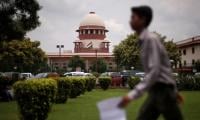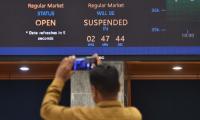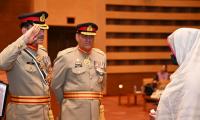LAHORE: The Lahore High Court on Tuesday observed how a structure can be erected on faulty foundations and directed a federal law officer to seek instruction from the interior secretary and apprise the court on a legal point whether the act of former military ruler Gen (retd) Pervez Musharraf who imposed emergency on November 3, 2007 amounted to abrogation of the Constitution under Article 6.
The court also directed the law officer to come up with a clear-cut statement whether the complaint against Musharraf could be withdrawn at this stage in the light of legal lacunas pointed out by Musharraf’s lawyer. “Come up with instructions from the interior ministry on these points,” observed the bench while taking up the petition of Musharraf who has been living in the UAE for the last couple of years.
Musharraf has challenged his trial under charges of high treason as well as legal flaws committed in the procedure. He said that owing to his deteriorating health, multiple life-threatening ailments and his aged mother, he was unable to return to Pakistan despite having a strong desire to do so.
During the course of hearing, the high court questioned whether the act of former military ruler in 2007 fell under the definition of Article 6 of the Constitution.
Justice Mazahar Ali Akbar Naqvi observed while addressing Additional Attorney General Ishtiaq Ahmad Khan “wasn’t declaring an emergency and abrogating the Constitution two separate things?” He asked the law officer where Article 6 applies and what did the SC judgment say.
“In case the legal requirements were not met, the government could take back the complaint or not,” the court asked. The court directed the government lawyer to get instructions from the interior secretary over the matter.
The additional attorney general requested the court time for getting instructions from the secretary interior.
Justice Naqvi asked the government lawyer if he had brought the record of Musharraf’s case. The federal government’s lawyer informed the bench that the case record has been submitted to the court.
On the other hand, Musharraf’s counsel Azhar Siddique said the previous federal government in the SC had said it would file a compliant against Musharraf and an inquiry would be initiated. However, the same was filed on the directives of former prime minister Nawaz Sharif instead of the recommendation of the federal cabinet. He expressed doubt that the prosecution team was also appointed on the advice of the then prime minister.
“It was the emergency or breach of the Constitution, three to four senior judges have given their opinion over it,” the court said. “You didn’t inquire into the matter and are talking about Article 6,” the bench remarked. “If you had to initiate a treason case, what was the need of an inquiry,” the judge questioned. “Does this process meet the transparency required over the matter,” he said.
Musharraf’s counsel, in his arguments, said the former prime minister initiated this case over personal grudge, the Supreme Court of Pakistan didn’t order the government.
Musharraf has said he is undergoing treatment. He sent a recorded video message from his hospital bed in which he said he was ready to record his statement in the case. “A judicial commission can come here and hear me out,” said Musharraf, adding that “the commission may see my condition and take decision and then the commission, with my lawyer, must be heard in the court,” he said.
The court adjourned the hearing till December 17.
After hot day, city’s atmosphere changed at night with light windstorm, which later changed into cool breeze
While strengthening currency may be welcome news for inflation hawks
Council approved M-6 Hyderabad–Sukkur motorway and M-10 motorway, which will link Karachi Port directly to Hyderabad
There were three applications court was asked to deal with today
District coordination committees will be granted powers to take action against individuals involved in terrorism
Any future rupee depreciation will see 70% of burden passed to consumers, with IPPs absorbing remaining 30%







